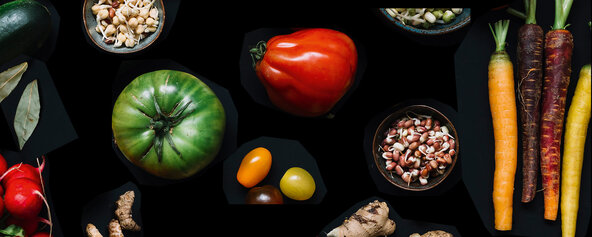
Different kinds of meals, new technology to make food and ever more plantbased alternatives: These three topics are in focus for food trend researcher Hanni Rützler, author of an annual report on how our eating patterns are changing. Climate change and the moralization of food are putting plants front and center in food culture, she says in “Plants for Future,” in her latest publication. “Climate discourse is changing the way we look at our world, at nature and our role within it,” says Rützler. People are eating differently, consuming fewer animal products and opting for plantbased diets instead. Plants are the raw materials for vegan food that people are picking to conserve the planet’s resources, she says. Culinary trendsetters like professional chefs are also moving with the times, putting vegetables, pulses and fruit at the heart of the dishes they make, instead of a piece of meat or fish.
The rise of the snack
The next area that Hanni Rützler looks at in her food report is “The New Job Normal”. Changing employment environments are also altering our eating patterns, says Rützler of her next area of focus. Meal structures are adapting to the new world of work. “Anyone who spends the day doing knowledge work, whether at home or in the office, sitting alone in front of the computer, who shares their remote working space with their partner and children, or who travels a lot for work will appreciate company restaurants that meet the new requirements of work-life blending,” she says. The pandemic accelerated change in the world of work and also transformed our eating behavior to some extent. More and more consumers tended to eat smaller, sporadic meals inbetween meals before the coronavirus broke out, instead of three meals a day, in a trend known as “snackification.”
But people started cooking at home again during lockdowns. They also started ordering food, leading to a boom for delivery services. The combination of those trends created a hybrid form of eating that poses a bigger challenge to company catering. Main dishes are being replaced by smaller dishes. Food culture is becoming more varied and of higher quality. That gives company canteens an important role in the new culture of work, as places where employees working in the office or at home can gather in smaller groups, for team meetings or informal get-togethers. Canteens are also creating take-away options for employees who come into work then head home to continue working there. Workplace cafeterias are increasingly becoming all day service companies.
Technology as opportunity
“The Green Taste of the Future” is Rützler’s third area of focus, as science creates whole new worlds of flavor. She sees a paradigm shift in production towards novel food, meaning products that were virtually unknown in the European Union before 1997. Unlike traditional foods, these need to be authorized first. “Many farmers see our food traditions as being jeopardized by novel foods,” she says. “But new technologies can help to preserve them in the long term.” Her observations come as the agricultural and food industry struggle with climate change and the need to find ways to cut their emissions and conserve resources. In the world of food production, innovative technologies may offer a solution.

